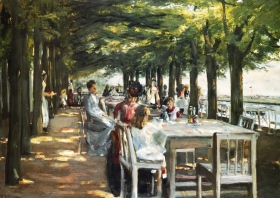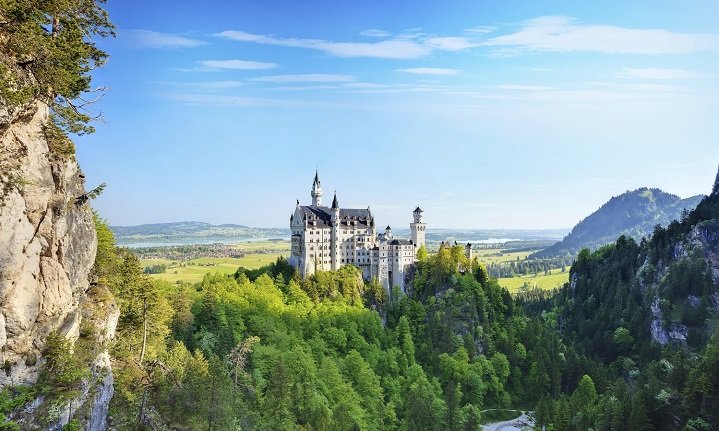German History 101
When people are asked about German history, they usually think about the two world wars and the cold war first. They think about Nazis, Hitler and the fall of the Berlin wall. Mostly that's because schools don't teach you much more about Germany than that (unless you actually live in Germany). It is, however, a fact that German history reaches far back – and when Mauer 1 [1] was found in Germany, it became known that prehistoric people have lived in that area for over 600,000 years. That is a lot of history to cover. Here is a short overview of important events in German history before the world wars (because you already know all about that).
750BC to 768 AD: The migration of the Germanic tribes and encounters with Rome
The movements of the Germanic tribes started in Southern Scandinavia and what we today know as Northern Germany. The tribes moved South, East, and West which led to confrontations with the Gauls (from what we know as France today) and other tribes from Central Europe. Though little is known about the Germanic tribes themselves, a lot of information is available from the time when Rome started its campaigns against Germania – to expand Rome's empire.
The event that is usually seen as the beginning of German history happened in 9 AD: The Battle of Teutoburg, in which a Cherusci leader managed to defeat the Romans and thus stop their advance into German territory.
Many movements and wars between German tribes happened in the first few centuries AD – whole books have been written about these, and you can still see some of the tribal heritage in various German areas if you only look.
The Middle Ages
The Middle Ages are fodder for many movies, books, and TV series. So we all think that we know a lot about them – but do we? Quite a long stretch of the middle ages is called the dark ages as hardly any written material remains from that time. For others, the dark ages are called dark because of a lack of intellectual developments (there are loads of arguments about this).
The Middle Ages are a very fascinating and multifaceted period in German history (and there are many books written about the various aspects of this time). Names like Hildegard von Bingen (she wrote many important botanical and medical texts), Johannes Gutenberg (known as the inventor of the printing press), Albrecht Dürer (a very popular artist), and Walther von der Vogelheide (probably the most renowned German bard from the Middles Ages) are all names that left a mark on German history and German developments in art and science.
Early 16th century: Reformation
Martin Luther's publication of his 95 theses [2] in 1517 was the start of the reformation era. People were annoyed with the church and the abuse of power by the church, and the church was seen as a corrupted, indulgent and abusive entity. People were eager for a change, and Martin Luther was the beginning of that change. Martin Luther was outlawed a few years later, but the movement started by his theses could not be stopped.
1618 to 1648: The Thirty Year War
This war was all about the conflict between the two religions: Catholics and Protestants just each thought they were right, and the other side had to be convinced that they were wrong. Violence seemed to be the only way to do this. Not only Germany was part of this war, it affected the whole “Holy Roman Empire”. The war ended with the “Peace of Westphalia”.
1648 to 1815: A time of wars and enlightenment
A lot happened in that period of time (it would take books to describe everything) – it is also the time of the French Revolution and general social unrest. It was a time of change, and one of the most important changes for Germany was that French was replaced by German as the language for the higher classes. Up to 1750, the German high society thought that everything French was the best, and they wanted to copy as much of French culture as possible. If you could not speak French, you were frowned at. This changed during the German period called “Enlightenment”. German philosophy, science, art, and culture were thriving – and France did not look all that great any more.
Names like Kant, Mozart, Bach, Goethe, and Schiller might ring a bell. Their works of philosophy, music and/or literature are still very popular and beloved these days – even in countries other than Germany. Goethe's Faust is one of the greatest pieces of German literature.
Foundation of the “Deutsche Reich” (German Empire) in 1871
Since 1815, the German states were loosely connected in a German confederation, but there was no “Germany” yet. Each state more or less did that they wanted. This changed in 1871, and this year can be seen as one of the most important milestones in German history.
In 1918, after World War I, Germany became the federal union it still is these days.
If you would like to learn more about modern German history, there is a good English version of a book by Volker Berghahn called “Modern Germany: Society, Economy and Politics in the Twentieth Century” [3]
-
References
- [1] For more information see: http://www.pnas.org/content/107/46/19726
- [2] You can read all of the 95 theses here.
- [3] Berghahn, Volker. Modern Germany: Society, Economy and Politics in the Twentieth Century. Cambridge: Cambridge University Press, 1982. ISBN 978-0-521-34748-8

_(2).jpg)


